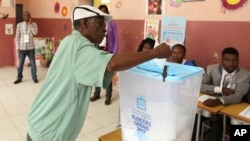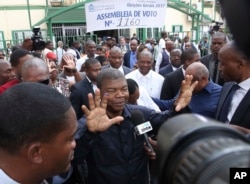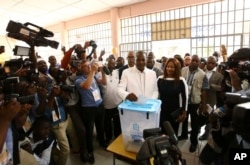ບັນດາຜູ້ມີສິດລົງຄະແນນສຽງ ໃນ ປະເທດອັງໂກລາ ກຳລັງເລືອກເອົາປະທານາທິບໍດີ
ຄົນໃໝ່ ໃນວັນພຸດມື້ນີ້ ເພື່ອມາສັບປ່ຽນ ທ່ານ Jose Eduardo dos Santos ຊຶ່ງເປັນ
ຜູ້ນຳມາໄດ້ດົນນານ ຜູ້ທີ່ຈະລົງຈາກຕຳແໜ່ງ ຫຼັງຈາກກຳອຳນາດມາໄດ້ 38 ປີແລ້ວ.
ຄາດກັນວ່າ ພັກຂະບວນການຂອງປະຊາຊົນເພື່ອປົດປ່ອຍອັງໂກລາ ຫຼື MPLA ຂອງ
ທ່ານ Dos Santos ຈະໄດ້ຮັບຄະແນນສຽງພໍ ທີ່ຈະຮັກສາອຳນາດຢູ່ຕໍ່ໄປ ດ້ວຍການ
ນຳພາໂດຍ ລັດຖະມົນຕີປ້ອງກັນປະເທດ ທ່ານ Joao Lourenco ຜູ້ທີ່ທ່ານໄດ້ຄັດ
ເລືອກມາຮັບໜ້າທີ່ແທນ.
ຜູ້ໃດກໍຕາມ ທີ່ຈະມາຮັບຕຳແໜ່ງແທນ ຈະໄດ້ປະເຊີນ ກັບການທ້າທາຍ ໃນການຮັບ
ມືກັບເສດຖະກິດທີ່ຝືດເຄືອງ ຢູ່ປະເທດທີ່ອຸດົມສົມບູນດ້ວຍນ້ຳມັນ ທີ່ໄດ້ເຫັນການ
ຂະຫຍາຍໂຕຂອງຕົນນັ້ນ ຊຸດໂຊມລົງ ຍ້ອນລາຄານ້ຳມັນທີ່ຕົກຕ່ຳ.
ພັກ MPLA ໄດ້ປົກຄອງ ອັງໂກລາມາ ນັບຕັ້ງແຕ່ ຕົນໄດ້ຮັບເອກກະລາດ ຈາກ
ປອກຕຸຍການ ໃນປີ 1975.
5 ພັກການເມືອງ ກຳລັງທ້າຊິງພັກ MPLA ແລະ ພັກຝ່າຍຄ້ານ ທີ່ສຳຄັນ 2 ພັກ ຄື
ພັກຮວມຊາດເພື່ອເອກກະລາດທັງໝົດຂອງອັງໂກລາ ຫຼື UNITA ແລະ ພັກພັນທະມິດ
ການເລືອກຕັ້ງ ຮວມຕົວທຸກພາກສ່ວນ ເພື່ອການຫລຸດພົ້ນ ຂອງອັງໂກລາ ຫຼື CASA
ໄດ້ກ່າວຫາພັກທີ່ປົກຄອງປະເທດໃນປັດຈຸບັນວ່າ ນຳໃຊ້ຊັບພະຍາກອນຕ່າງໆ
ຂອງລັດຖະບານ ເພື່ອການໂຄສະນາຫາສຽງ ແລະ ອ້າງວ່າ ໂຄສົກຂອງທາງການ
ໄດ້ໃຫ້ສິດທິພິເສດ ແກ່ພັກດັ່ງກ່າວນັ້ນ.
ພັກ MPLA ໄດ້ປະຕິເສດຕໍ່ຂໍ້ກ່າວຫາທີ່ວ່ານັ້ນ.
ຄະນະກຳມາທິການເລືອກຕັ້ງ ຂອງອັງໂກລາ ບໍ່ໄດ້ເອົາຫົວຊາ ຕໍ່ຂໍ້ກ່າວຫາວ່າ ພັກ
MPLA ສໍ້ໂກງຄະແນນສຽງ ໂດຍກ່າວວ່າ ຂັ້ນຕອນການເລືອກຕັ້ງ ຈະໂປ່ງໃສ ແລະ
ເປັນທຳ.
Voters in Angola are choosing a new president Wednesday to replace longtime leader Jose Eduardo dos Santos, who is stepping down after 38 years in power.
Dos Santos' People's Movement for the Liberation of Angola, or MPLA, is expected to get enough votes to remain in power, led by his chosen successor Defense Minister Joao Lourenco.
Whoever takes office will face the challenge of addressing economic struggles in the oil-rich nation that has seen its growth hurt by a fall in prices.
The MPLA has ruled Angola since its 1975 independence from Portugal.
Five parties are challenging the MPLA, and the two main opposition parties -- the National Union for the Total Independence of Angola, or UNITA, and Broad Convergence for the Salvation of AngolaElectoral Coalition, or CASA -- have accused the ruling party of using government resources for campaigning and allege that the state broadcaster has given the party preferential treatment.
The MPLA has denied irregularities.
Angola's election commission has also dismissed fears that the MPLA would rig the vote, saying the process will be free and fair.
Some voters were undeterred by the controversy and said they were eager to participate in this poll.
"I'm going to vote for the first time," 21-year-old ruling party supporter Daniel Cailane said. "I'm excited to give this contribution to my country."
Eighty-year-old Domingos Nicolau spoke of the hope he had when Angola gained independence from Portugal, and how he is disappointed that the nation's immense oil wealth hasn't trickled down to him or his 12 grandchildren -- or, for that matter, the majority of citizens. That's why, after previously supporting the ruling party, he's changing sides.
"We want to make a free and a fair change," he told VOA.
That is a common refrain on the hectic streets of this seaside capital, where luxury cars and banged-up buses weave through potholed streets, where oil rigs twinkle off the coast at night, lending the only light to coastal neighborhoods that have never had electricity.
It's also where one man watches from his pink palace atop Luanda's highest hill, and prepares, after so many years, to step down.








